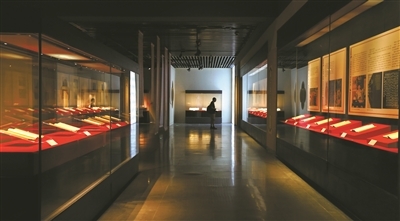The Yongle Encyclopedia is showcased in Ningbo with many
- Details
- Category: Top News
- Published: Tuesday, 10 October 2023 14:40
Ningbo elements

The Yongle Encyclopedia is a collection of classical Chinese literature, with a rich collection of brilliant works. On September 8th, the exhibition "The Return and Reconstruction of the" Yongle Encyclopedia" opened at the China Port Museum in Beilun. The exhibition is co-
hosted by the China Port Museum and the National Library, aiming to provide viewers with a comprehensive understanding of this unparalleled masterpiece and to experience the depth of Chinese classics and civilization.
This exhibition showcases over 87 types of exhibits and over 70 volumes (pieces), including 6 copies of the Jiajing copy of the Yongle Encyclopedia, including the copies of“湖”(lake), “油”(oil),“站”(station),“人”(people).
Among them, the "湖"(lake) book includes the content related to Dongqian Lake in the "Siming Chronicles" and "Ningbo Prefecture Chronicles". The “油”"Oil" book includes the "Fragrant Oil" in the "Annals of the Various Tribes". The fragrant oil was exported from the Great Food Country and had a similar odor, with strong and no residue as the top priority. The Tibetan people often applied it to their bodies, and those who suffered from cold also followed suit. It can be combined with soft incense and used for medical purposes. The "Yuan Chronicles" reports that the fragrant oil is a shipment of goods from Ningbo Prefecture. It reflects that during the Song and Yuan dynasties, a shipping department was established in Mingzhou (Qingyuan), and Ningbo became the core port of the Maritime Silk Road. The "Station" booklet states that "there were two horse stations on Qingyuan Road (now Ningbo) with 40 horses and two water stations with 16 ships." It compiles the records of Ningbo's foreign goods in the "Siming Chronicles" and "Yuan Chronicles ", such as Suhe fragrant oil, Dafeng oil, and black naphtha. It is of great significance for studying the trade development and foreign relations of Ningbo at that time.
The Yongle Encyclopedia also records many historical, geographical, literary and other aspects of the Ningbo region, fully reflecting that Ningbo is a city that is inseparable from water
